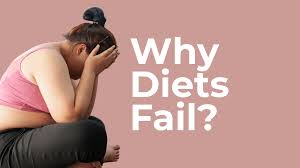Ever feel like you’re on a never-ending merry-go-round of diets? You start a new plan with a burst of motivation, see some initial progress, and then… it all falls apart. You’re back where you started, feeling frustrated and a little defeated. If this sounds familiar, you’re not alone. The truth is, diets often fail, and it’s not because you lack willpower. It’s because the “diet” approach itself is fundamentally flawed.
The Problem with Diets: A Vicious Cycle
Diets are often about restriction. They tell you what you can’t eat, leading to feelings of deprivation. Think about it: the moment you’re told you can’t have chocolate, all you can think about is chocolate! This constant battle with cravings and a strict set of rules creates a psychological and biological trap.
The Restriction-Binge Cycle:
You stick to your diet perfectly for a few days or weeks. Then, the craving for a “forbidden” food becomes overwhelming, and you give in. This often leads to a “what the heck” moment, where you overeat, feeling guilty and defeated. The guilt makes you want to go back on a strict diet, and the cycle repeats.
Slowed Metabolism:
When you drastically reduce calories, your body enters survival mode. It thinks there’s a famine and slows down your metabolism to conserve energy. This makes it harder to lose weight and easier to regain it once you stop dieting.
Unsustainable Rules:
Most diets are not designed for real life. They can be difficult to follow when you’re eating out, celebrating with friends, or just having a stressful day. The rigid rules make them impossible to stick with for the long term.
So, What’s the Alternative?
The secret to lasting weight loss isn’t a new diet; it’s a new mindset. It’s about moving away from short-term fixes and embracing a lifestyle change.
- Focus on Habits, Not a Number on the Scale: Instead of obsessing over pounds lost, focus on building small, sustainable habits. Can you add a vegetable to every meal? Go for a 15-minute walk after dinner? These small wins build confidence and are much easier to maintain than a drastic overhaul.
- Listen to Your Body: Forget about strict meal timings and calorie counting. Start paying attention to your body’s hunger and fullness cues. Eat when you’re hungry, and stop when you’re comfortably full. This concept, known as intuitive eating, helps you build a healthier relationship with food.
- Move for Joy, Not Punishment: Exercise shouldn’t be a chore you have to “get through.” Find a physical activity you genuinely enjoy. Maybe it’s dancing, hiking, swimming, or playing a sport. When you love what you’re doing, you’re much more likely to stick with it.
- Embrace “Good Enough,” Not Perfection: Nobody is perfect. You will have days where you eat a little more or skip a workout. And that’s okay! Instead of letting a slip-up derail you, simply get back on track with your next meal or workout. This “all or something” approach is far more effective than the “all or nothing” mentality of dieting.
- Prioritize Sleep and Stress Management: Did you know that lack of sleep and high stress levels can directly impact your weight? When you’re tired or stressed, your body produces hormones that increase cravings for unhealthy foods and promote fat storage. Make time for relaxation a non-negotiable part of your routine.
The Takeaway
The diet industry thrives on the idea that there’s a quick fix. But true, lasting weight loss isn’t about restriction; it’s about building a healthier lifestyle, one small change at a time. It’s a journey of self-care, not self-deprivation. So, ditch the diet, and start focusing on creating a life you love—a life where food is nourishing, movement is fun, and your body is a friend, not an enemy.

